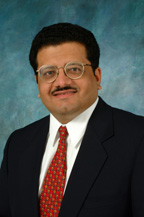 After its first year of operation, the Nebraska Epilepsy Program at UNMC and its hospital partner, The Nebraska Medical Center, has been a huge success with more than 300 epilepsy patients presently being treated.
After its first year of operation, the Nebraska Epilepsy Program at UNMC and its hospital partner, The Nebraska Medical Center, has been a huge success with more than 300 epilepsy patients presently being treated.
The program is under the direction of Sanjay Singh, M.D., who joined UNMC’s neurological sciences department in July 2002 as assistant professor. A native of India, Dr. Singh is Nebraska’s first trained epileptologist. He did his neurology residency at George Washington University in Washington, D.C., where he was chief resident, and his fellowship in epilepsy and clinical neurophysiology at Yale University in New Haven, Conn.
“Difficult disease”
“Epilepsy is a very difficult disease,” Dr. Singh said. “People with epilepsy never know when they are going to have their next seizure. They must depend on other people to drive them places, and frequently they lose their jobs, because people don’t understand the disease.” Sometimes called a seizure disorder, epilepsy is a chronic medical condition produced by temporary changes in the electrical function of the brain, causing seizures that affect awareness, movement or sensation.
20,000 Nebraskans have epilepsy
Approximately 20,000 Nebraskans have epilepsy, and of that total about 6,000 have intractable epilepsy and require specialized care. Because of the high demand, Dr. Singh said they are currently scheduling patients six months in advance. Exceptions are made for more complex cases.
|
The celebration event will begin at 10 a.m. and is open to Medical Center employees. Brief presentations will be made by: Harold M. Maurer, M.D., UNMC chancellor; Glenn Fosdick, president and CEO of The Nebraska Medical Center; Pierre Fayad, M.D., professor and chairman of the UNMC department of neurological sciences; national epilepsy experts, Drs. Dennis and Susan Spencer; Dr. Sanjay Singh; and an epilepsy patient from the Omaha area who has been successfully treated at the Nebraska Epilepsy Program. |
About 181,000 new cases of epilepsy are diagnosed each year in the U.S. with 42,000 deaths occurring annually as a result of prolonged seizures. It’s estimated epilepsy costs the country more than $12.5 billion per year. Of the 2.3 million people with epilepsy, 86.4 percent are more than 15 years of age.
The Nebraska Epilepsy Program
The Nebraska Epilepsy Program is based on a comprehensive four-phase monitoring and treatment program. The cornerstone of the program is the video EEG monitoring system contained in Phase I. During the initial phase the patients are monitored as inpatients. The average length of stay is about five days with about four seizures being recorded. The state-of-the-art video monitoring system records seizures around the clock. By monitoring a patient, the team first identifies if the patient has epilepsy then determines which type of epilepsy the patient has.
“Phase I is the real critical part of the program,” Dr. Singh says. “Our monitoring equipment is state-of-the-art and allows us to make the best evaluation possible.” Dr. Singh says very few centers around the country currently use this advanced monitoring system.
The system calls for patients to have 28 EEG electrodes placed on their heads. “Most epilepsy centers only use 20 electrodes,” Dr. Singh said, “but the additional electrodes allow us to be more accurate in our diagnosis.”
Testing and treatment
After the testing is complete, the entire treatment team meets to review data. From the findings, a treatment plan is developed and medications are prescribed. If the medication therapy fails, the patient moves on to Phase II. Patients that go beyond Phase I are potential surgical candidates. Approximately 20 to 25 percent of epilepsy patients nationally are surgical candidates.
“We have learned so much about the brain in the last three or four years,” Dr. Singh says. “Therefore, you really need to keep abreast of the advances. If you studied epilepsy 10 years ago, almost everything has changed since then.”
Starting a local chapter
Nebraska is the only state in the United States that doesn’t have its own chapter of the Epilepsy Foundation of America, the primary patient advocacy organization for families with epilepsy. Dr. Singh said several Nebraska patients are now working to start a chapter in Nebraska.
Leading epilepsy experts in Omaha
In addition, UNMC is hosting a regional epilepsy conference on Sept. 19 at the DoubleTree Hotel at 1616 Dodge St. Nearly 80 health professionals have signed up for the conference, which is believed to be the first epilepsy conference ever held in Nebraska.
Two of the leading epilepsy experts in the country – Drs. Dennis and Susan Spencer – will present at the conference, which will run from noon to 5 p.m. Dr. Dennis Spencer is interim dean of Yale University School of Medicine and chairman of Yale’s department of neurosurgery, while Dr. Susan Spencer is professor of neurology at Yale and the former president of the American Epilepsy Society. Dr. Singh also will present at the conference along with John DeToledo, M.D., co-director of the International Center for Epilepsy at the University of Miami School of Medicine.
Midwest has few epilepsy programs
Epilepsy programs are led by a trained epileptologist, who has had two years of specialized training in epilepsy. They also include a neurosurgeon who specializes in epilepsy surgery, Advanced Brain Imaging techniques (such as PET, SPECT and special MRI techniques) and a neuropsychologist.
The Nebraska Epilepsy Program is the only epilepsy program in Nebraska, Western Iowa and South Dakota.